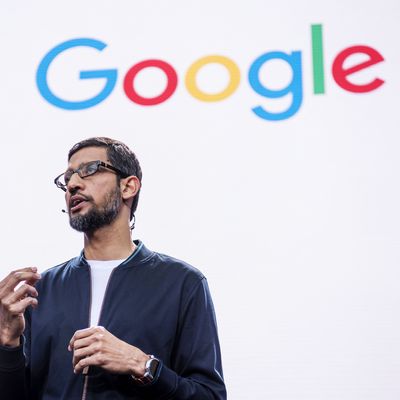
Google, with its goofy logo and name, has never really been a flashy tech company. On the product level it’s always lacked the showmanship or salesmanship of Facebook or Apple, especially recently, as a surging Facebook has made a series of splashy announcements about its investments in hip new technology — VR! Bots! A monstrous drone-based wireless network!
Anyone looking for something similar from Google’s I/O developer conference this afternoon would have come away disappointed. It’s not that the announcements were a bust. The company unveiled a lot of neat stuff. But “neat” is the right word: nothing surprising, nothing game-changing, nothing mind-boggling, nothing bad. Just, you know, neat: Pleasant new apps for chatting over text and video, an Amazon Echo–like speaker called Home, a new-virtual reality headset, and a bunch of new tech specs for developers to pore over regarding Android. The tech talk was boring if you are a consumer and not a developer, but guess what: It’s a developer conference. So it goes.
The truth is, developer conferences like I/O, Facebook’s F8, and Apple’s famous WWDC, are getting less and less exciting every year. At the scale of the Fearsome Five of tech, the industry is fairly predictable: Each company has some kind of VR product; each company has some kind of chat-and-video messaging app; each company has some stake in the coming driverless-car revolution. And each company has a bot, or many. The current running beneath I/O was artificial intelligence — one of the handful of sectors on which the Fearsome Five have converged to compete for what could be enormous future growth.
And that’s just fine for Google. Demos for Google Assistant and Google Home, the two products leading off the event, showed people conversing with their phones and Bluetooth speakers pretty naturally — changing reservations, turning on lights, and translating text. Granted: Bots always break once unleashed upon the greater populace, but we have every reason to believe that Google’s AI will function well.
This is because, unlike Facebook, Google has spent the last two decades parsing user queries and requests. Using Facebook, browsing your news feed, clicking interesting links, and reading status updates, are mostly passive experiences. The News Feed algorithm delivers things to you without any initial input. Googling, on the other hand, is an active task, querying the search engine for specific bits of info, maybe rewording your search term if you’re not getting results. Those 20 years of data-gathering and experience give Google a lengthy head start on operations like determining the context of a given request (essential to when users deliver vague or terse voice commands).
You can already see some of this in action, as in Inbox, the Gmail client that can automatically deduce when you’ve booked a flight and add it to your calendar, or realize when you’ve placed an order and track the package. But it’s still most obvious in Google’s core product: Search. If you search for a movie on Google, the service pulls local showtimes automatically. It assumes that when a user queries for a recent film, the context is that they want to go see it.
Other personal assistants, like Amazon’s Echo and Apple’s Siri, are somewhat less functional. They tend to rely on third-party stores of information like Wikipedia — and, uh, Google — to serve up necessary data. Facebook is much better at knowing specific things about its users, but it’s still ill-equipped to determine what they want in specific instances. For a long time, as an example, if you changed your status from “In a relationship” to “Single,” Facebook could determine that you were single — a useful data point for advertisers — but not that you had gone through a breakup. Its News Feed algorithm still regularly delivered users updates on their ex, because the context wasn’t taken into account.
Facebook’s entry into the bot universe is unquestionably a play for some of Google’s market share — in search, in commerce, in the great nebulous world of “asking for things online.” It’s not just that AI has finally reached a level of advancement to make it feasible in a chatbot product, it’s that Google’s rivals sense the company’s potential weakness as users transition to a mobile, app-based internet.
But you’d be stupid to count Google out. Google’s never been able to make hardware (or even operating systems) that really compete with Apple; its attempts at Facebook-like social networks have failed many times now. But it’s still really goddamn good at one thing: taking the words users type into a text box, making sense of them, and giving users back what they want. The current trend of chatbots and conversational UI is perfect for Google because, since 1998, Google’s been trying to figure out what the hell it is you’re asking for. Unlike other platforms, it has the necessary tools to answer.





























